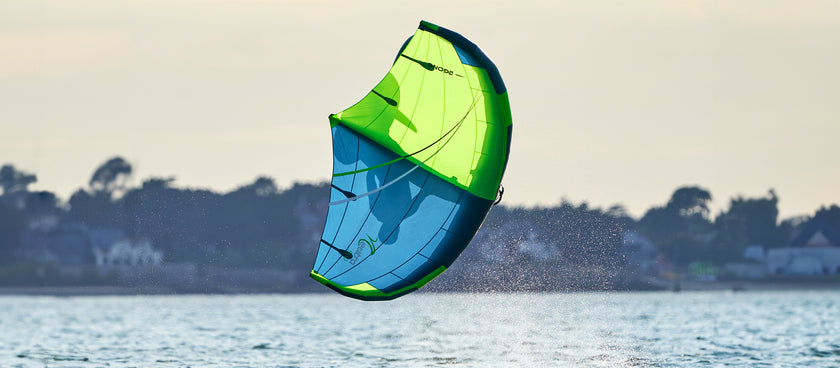
GREAT DEAL: 20% DISCOUNT ON THE PERF SERIES WINGS FALL LINE 2024!
Take advantage of a 20% discount on the purchase of a Plus, Droid or Neutra wing from the Perf Series...
The versatile and accessible wing to learn and progress! It’s the Allround wing of our range.
The Plus will make you progress faster than any wing. But it is much more than a beginner’s wing: it is the most versatile wing out there.
Its power at the heart of the profile allows you to fly within two pumping strokes and discover wing foiling without having to be overpowered. Pumping is made more simple as the PLUS has a reduced wingspan. This translates to an easy progression, with confidence, in a pleasant wind range.
Its featherweight allows you to go for one long session after another comfortably and to make your maneuvers very easily. You will progress quickly. Its perfect balance positions it very naturally in the wind and allows you to find the right course immediately. It’s almost on autopilot!
This model has truly enjoyed incredible evolutions year after year. Maneuverability and accessibility are boosted. Piloting the wing is really more comfortable and more intuitive; this is felt from the get go up to your first maneuver.
This new Plus comes with more torque to bring you an early takeoff. Its advanced and relatively marked draft develops good power. Ideal when you don’t know how to pump perfectly, it’s also great not to have to bother with an extra square meter for more power. On the contrary, the Plus will allow you to use a small surface that is very manageable, pleasant and lighter. This also means you won’t have to struggle to flip a large wing over after each fall. Besides, pumping with a smaller wing is less physical too.
Its dynamic twist makes it a smooth and extremely tolerant wing. If the central part of the wing pulls hard, the tips as for them, open in gusts to regulate the power. The control is total and automatic! These characteristics give this wing the widest wind range possible and narrows the PLUS to 4 sizes: 4m2, 5m2, 6m2 and 7m2 for the biggest riders. It delivers power in light wind conditions, yet it remains comfortable and stable in stronger winds!
The Plus is equipped with the triple window on the central batten and on the canopy ideally placed to offer panoramic visibility around you. It’s more comfortable than having to put the wing above your head to check what’s happening leeward, and it’s above all an essential asset in terms of safety when you’re starting out!
In high performance, the Plus does not have to blush against the best wings. On the contrary, since its thing is to do everything well and easily. Its shape covers all uses with great efficiency. Freeride of course, but also Race with its powerful profile, Waves and Freefly with its lightness, and even Freestyle with its compactness. The Plus can do it all. So do not see it as a school wing that will have to be sold quickly. It is a wing that is perfectly suited to 80% of wing foilers.
And the new evolution of the PLUS contributes to even more versatility! It is now equipped with our revolutionary GONG Fastening System!
You can now upgrade your wing according to your uses or your preferences, switching in two tightening key turns, from the textile handles delivered as standard, to the rigid carbon handles or to our carbon boom. A real innovation at the service of your sensations. Adapt your wing to your level, to your feelings, and even to the type of session you wanna have because nothing prevents you from mounting the rigid handles for freestyle, the boom for speed runs and the textile handles for wave riding.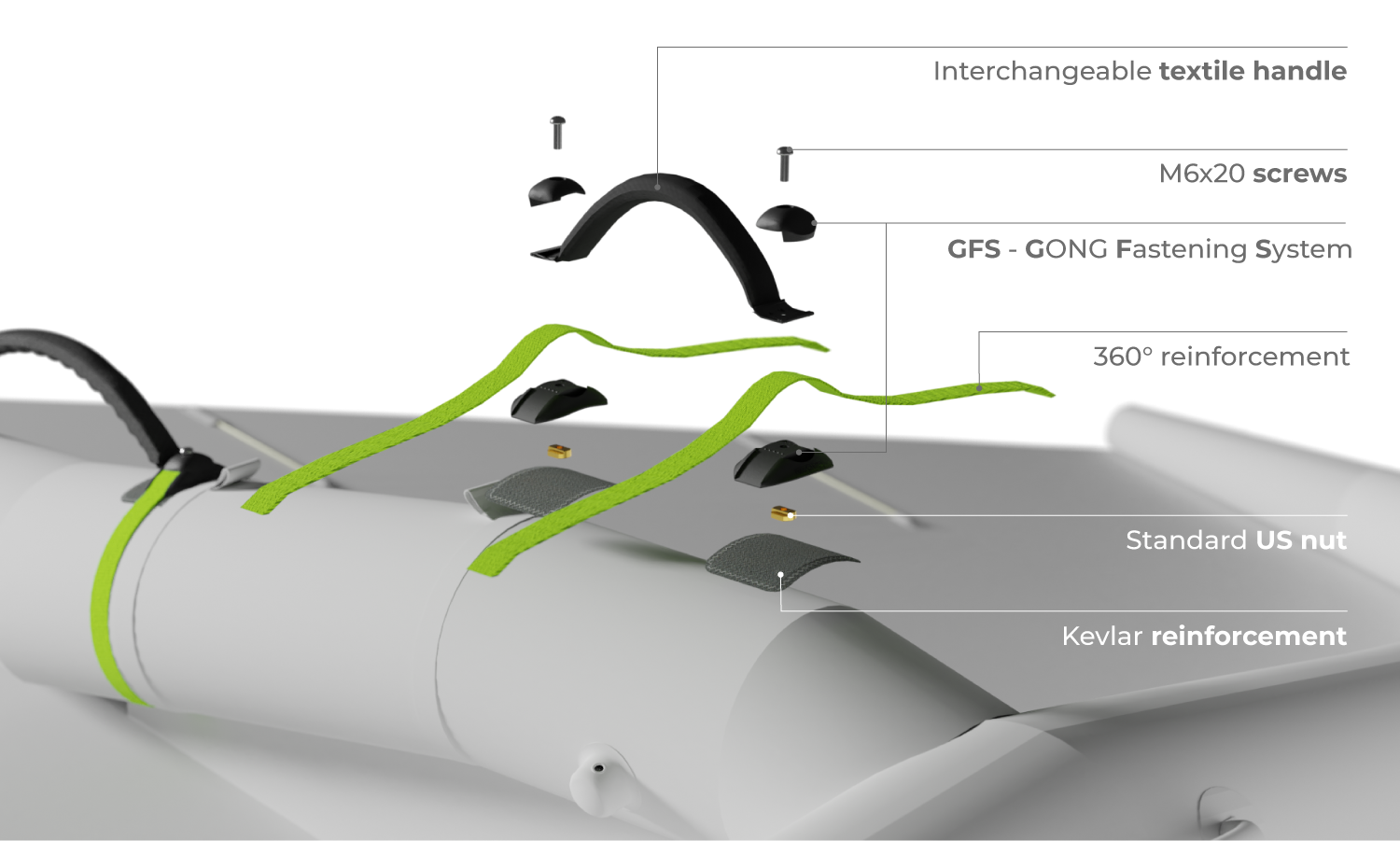
Your benefits are clear:
Solidity is a crucial point during your progression phase. The Plus is light but really strong. First, thanks to the premium materials we use. Then by the quality of assembly which ensures record breaking strength. Finally by a clever design which positions the seams to stiffen the wing but also limit tearing in the event of a contact with the foil for instance. Note that the tips are made more accessible to change the bladder easily if necessary. (Learn more about the technology of the PLUS).
Technical sheet
Buying guide
Ideal for beginners thanks to its easy, soft and predictable character, it is aimed at all riders who want to enjoy long freeride sessions in great comfort and without having a wing set for a specific program.
The most experienced will love it mounted with rigid handles for its versatility which allows you to really exploit all wing programs.
Designed for beginners but also for experts, the wing Plus is really perfect for discovering this sport and progressing quickly.
Versatility and accessibility are the trademarks of the Plus. Clearly its role is to facilitate your first year of wing foiling, but not only!
Light, powerful, easy, it has all the qualities to bring you to a good level and even much more.
It will respond perfectly to your needs because:
An ideal wing for beginners or for those who want a wing to do everything!
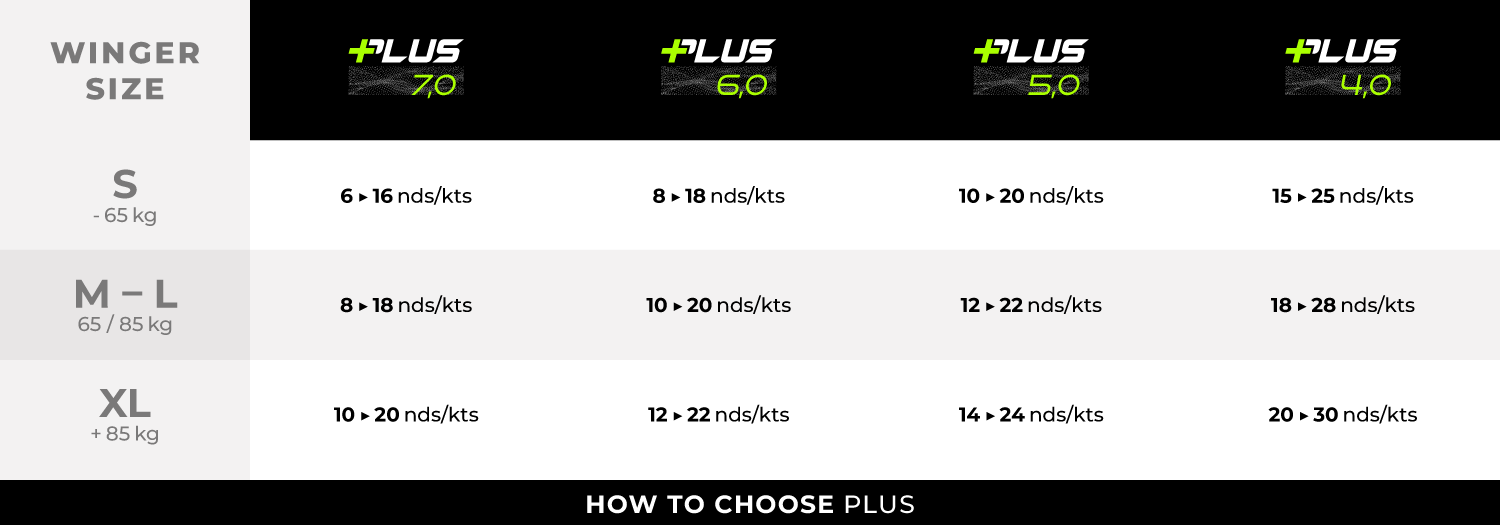
Don’t overestimate the power of wings. The reality is that for a 85kg winger, you need 15/20 knots with a 5m² to fly to get flying the first few times. After about 15 sessions, you will fly at 15 knots with a 5m².
And if you’re athletic, pumping hard can make you take off at 12 knots in 5m² and hold the flight through 8 knots lulls. All this can be learned and requires practice.
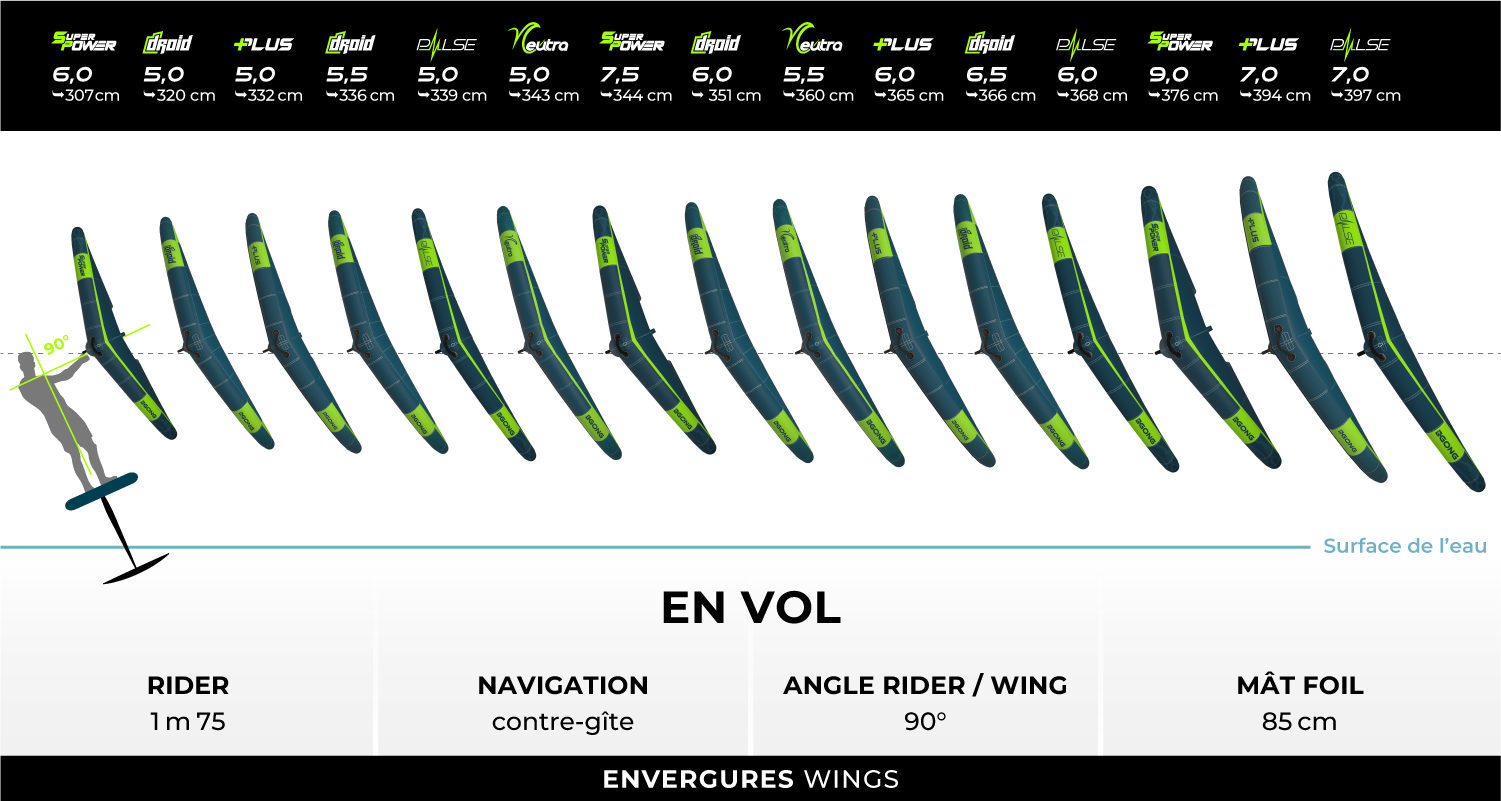
You can (should) add to this combo a SUP for windless days, and surely a board dedicated to surfing. But if you’re heading towards wing foiling, you may already have these toys in the garage ? ?
A 5’5 to 8’ wing leash will be ideal. Preferably a model dedicated to wing foiling and of the coiled type. A short leash allows you to get back on the board quickly. By letting the board go further, a long leash prevents contacts between the foil and the wing.
Check its condition before each session and change it every year. It’s your life jacket.
Don’t let your wing flap in the wind at the end of the leash, it’s not unbreakable! Ditto in the waves, do not hold your Wing by the leash, it will explode and/or you will get hurt.
Riding without a harness is sexy because it’s a thing of the moment and it makes you feel free. You can move in all directions, it’s really nice.
But it is necessary to be slightly underpowered if you do not want your arms to burn too quickly. This also means more pumping to take off.
All our wings have harness line attachments since 2021. So, the choice is yours.
So, if on the other hand you like to ride with bigger wings to avoid pumping like crazy with each relaunch, the use of aharness is almost mandatory if you don’t want to do one-hour sessions or only 300m reaches.
In this case, the installation of the GONG harness line is super simple. Our harness line is light and really well thought out.
Important point: spare yourself. Do you think it’s okay to hang on your hands for hours? Will it be good for your body in the long run? Why not kitefoil without a harness then ? We prefer to warn you about the consequences of long-term intense practice on your body without being able to spare yourself with a harness.
Please note: putting on aharness does not mean using it all the time. It is at your discretion. But you can simply organize your sessions with moments of recovery over a few hundred meters to send even harder afterwards.
We recommend using a harness that is as light and discreet as possible, with windsurf type hook (narrow). Exactly what we have developed at GONG so that you never feel tied up, to preserve this feeling of freedom, to be able to breathe and feel light.
So, it’s up to you to see if sensation and aesthetics prevail over performance. But it is a safe bet that soon all riders will have harnesses because the evolution will go towards more powerful wings and more performance. So inevitably we need to spare our arms, otherwise we ride like a snail when we have a rocket at disposal.
It’s your choice :
With this very versatile wing, we prefer textile handles for beginners. But once you know how to fly, many will go for rigid handles for their piloting precision. Everyone has their own opinion, the choice is yours.
Wings with windows are safer.
For beginners, a wing with windows is a must because safety comes first. They are used to see a silhouette to abort a dangerous curve that would cause a collision, without having to manipulate the Wing and expose yourself to a fall.
Without windows, you always have to check what is happening downwind by raising the wing, especially in maneuvers and tricks. Not necessarily the most pleasant thing to do.
Equipments
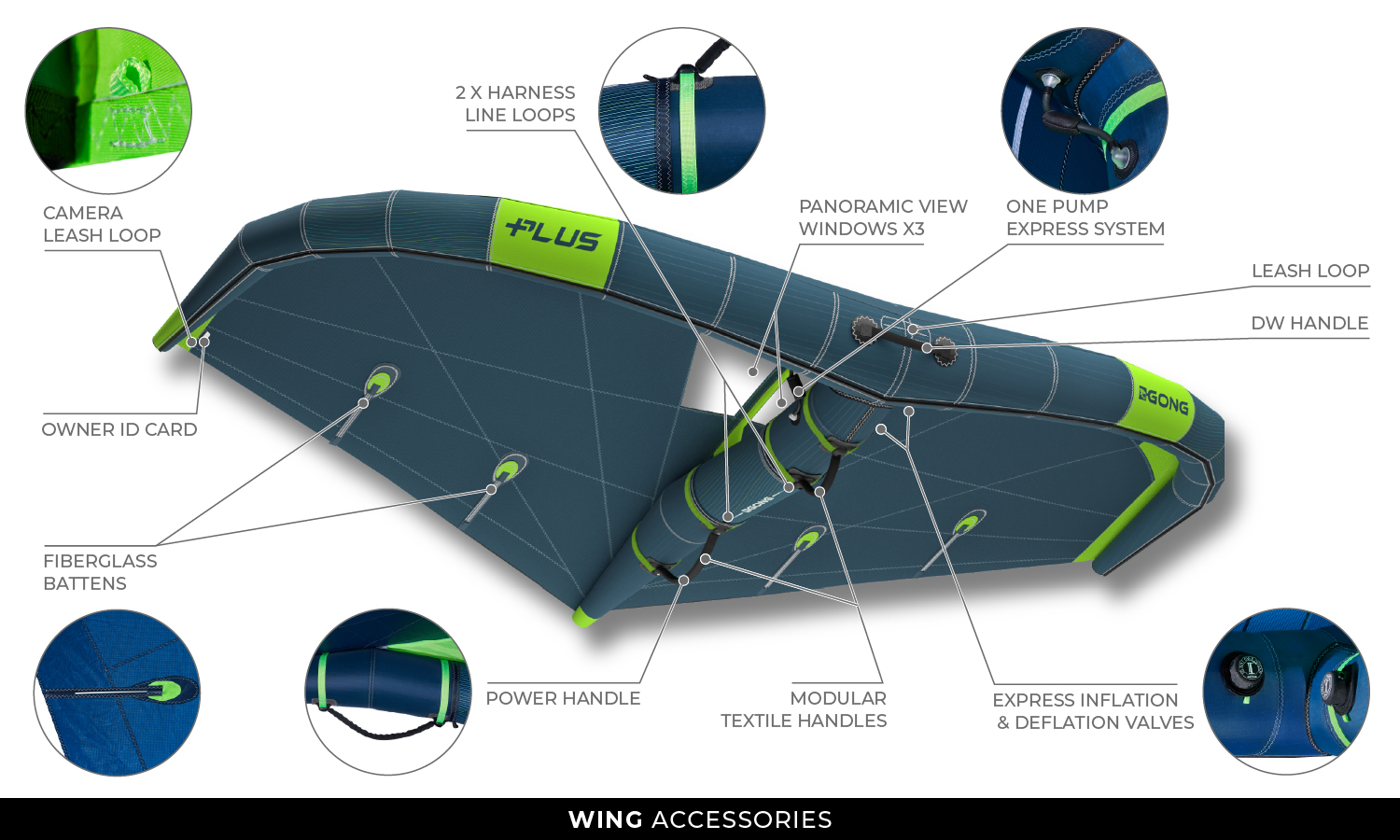
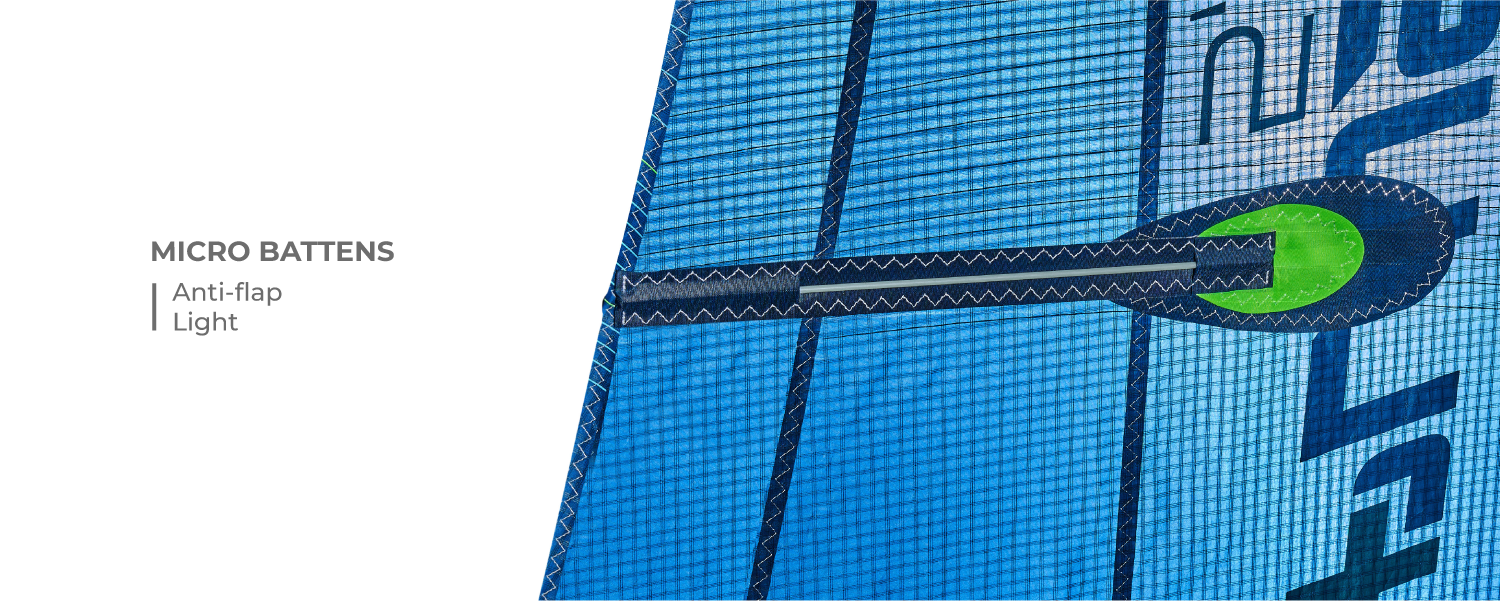
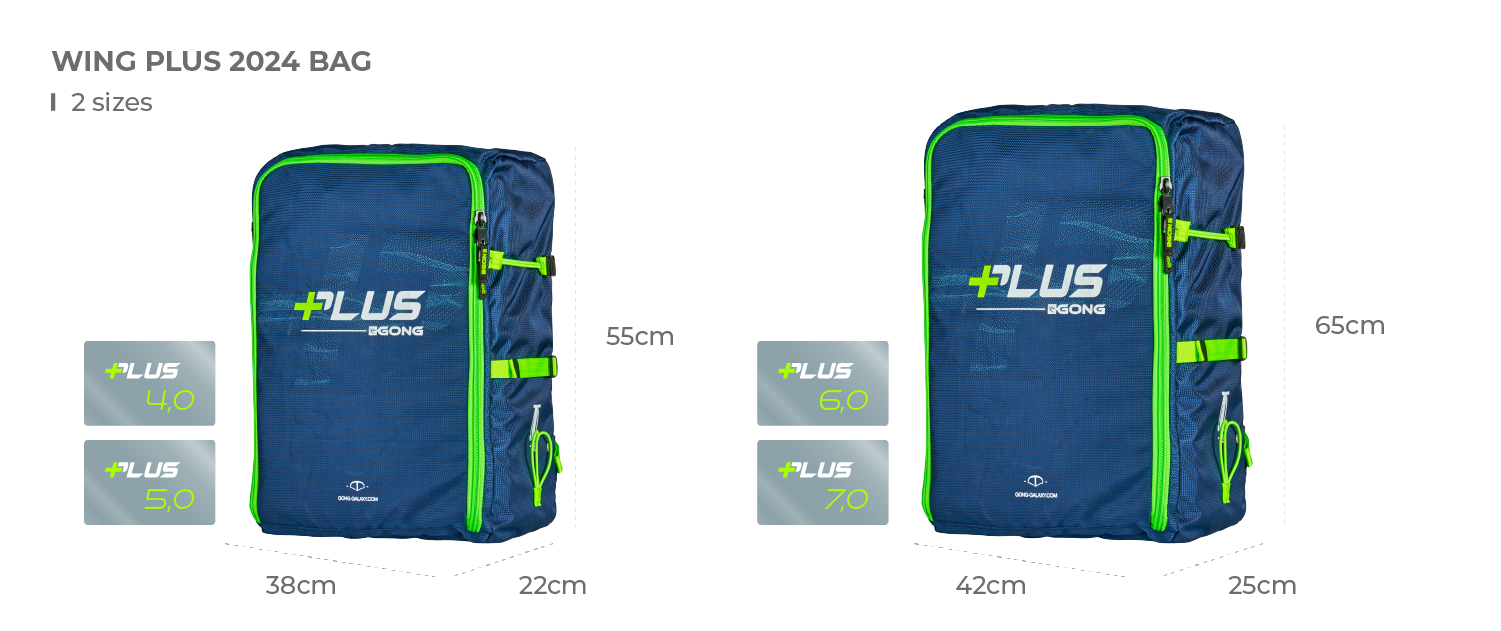
Delivery
We indicate a preparation and shipping time of 3 working days. In reality, the majority of orders are shipped within 24/48 hours.
The delivery time, i.e. delivery time of the package to your home, then depends on the delivery location and the carrier.
We work with reliable and efficient carriers. 99% of shipments go perfectly and quickly. In the case of the remaining 1%, rest assured that we will do what is necessary with the carrier.
Unlike other sites, shipping costs are not hidden behind the price of our products. You know exactly what shipping costs you, and you are not disadvantaged if you choose to collect your order at our GONG Space Center.
Shipping costs are calculated based on the weight and volume of each package, and your delivery address.
Delivery tracking is managed directly by the carriers to whom we have entrusted your packages. They will contact you by email or SMS to allow you to choose delivery methods and follow the route of your package.
We work with the best transport societies to deliver to you throughout Europe and the world within very short deadlines. We chose them for their quality of service and their compliance with deadlines.
For mainland France, 80% of your orders arrive at their destination in less than 48 hours of processing.
For Europe, delivery times vary from 3 to 6 working days, depending on the country of destination.
For the rest of the world, delivery times depend on transit time and customs clearance time. This delay depends on customs and can last from a few days to a few weeks depending on the destination and seasonality.
Please note, transport time is added to preparation/shipping time. Two companies collaborate on your order (GONG and the carrier). Each one masters its activity and is committed to optimizing its deadlines so that you are delivered as quickly as possible and at a reasonable price.
Preserving the environment is an absolute priority. This is why we do everything possible to reduce our ecological footprint.
The most important thing is to sell quality, durable products that will be repairable and will please you for a long time.
For our shipments, we use:
Scotch craft paper.
Final packaging in high-end cardboard.
For rigid boards: Flexi-Hex, very high resistance ecological packaging.
This means:
Reusable and recyclable packaging.
An almost total reduction in single-use plastic.
Maximum protection and impact resistance for rigid boards thanks to the innovative Flexi-Hex honeycomb design (35mm thick).
Upon delivery, check the condition of your package in the presence of the carrier. A complete explanation email on the procedure to follow will be sent to you when your order is shipped.
Despite our requirements and all the care we take in the packaging and protection of your product, transport hazards may occur, and your product may suffer more or less significant transport damage.
Note that the products are protected in their carton. If you have any doubts, simply refuse delivery and contact us.
More infos
La Wing est une aile à structure gonflable directement dans les mains du rider. Des poignées permettent de contrôler son vol et la puissance délivrée.
L’atout numéro 1 de la Wing c’est l’absence de pied de mat. On peut ainsi passer d’une traction horizontale de type planche à voile à une traction verticale de type kite. On combine à loisir le meilleur des deux mondes, dans une liberté totale.
Bien moins compliquée qu’une aile de kite et bien moins lourde qu’une voile de windsurf, la Wing vous allège au zénith et accélère face à vous.
La Wing associe les avantages et les moves de ces deux sports, et elle en donne encore plus avec toutes les possibilités liées à la neutralité en surf, et aux rotations sous la Wing et autres désaxages… le potentiel de moves est sans fin.
Moteur idéal d’un engin à foil, elle est bien plus rassurante qu’un kite et bien plus maniable qu’une voile de windsurf.
La Wing est de loin le support le plus simple pour apprendre à faire du foil, loin devant tous les autres sports. Une super entrée en matière pour foiler ensuite dans les autres sports.
C’est l’engin parfait :
Avec sa glisse, on n’est pas obligé de surtoiler pour s’éclater. Dans les rafales, sa structure encaisse naturellement les excès de puissance. Les pros pourront mettre un harnais pour toiler plus et doper les performances. Mais les amateurs trouveront aussi un vrai soulagement dans le harnais. Contrairement aux idées reçues, c’est la Wing qui porte vos bras, pas l’inverse. Mais après deux heures sans harnais, il faut avouer que la fatigue est là. Libre à chacun de s’accrocher à mains nues ou de se soulager.
Idéale avec un foil, elle demande plus d’air qu’un kite qui aura toujours comme avantage de tracter énormément dès 4/5 nœuds. La Wing va demander entre 10 et 15 nœuds pour s’exprimer sur un foil et restera super facile même dans 35 nœuds, voire 50 nœuds, là où le kite rime souvent avec grosse prise de risque.
Elle est géniale avec une pure board de Wing, mais aussi avec de multiples supports tels que :
Les atouts de la Wing sont clairement identifiés : simplicité, compacité et légèreté apportent une liberté de mouvement et une facilité de prise en main inégalées. La Wing est prête à voler en 1min chrono : pas de ligne à dérouler, quelques coups de pompe et c’est parti.
La technologie utilisée pour la fabrication des Wings est très proche de celle de nos ailes de kitesurf, mais en beaucoup plus solide. De multiples renforts sont présents sur les zones d’efforts en fonction des différentes utilisations.
Le shape de la Wing est « auto-stable ». N’imaginez pas l’orienter par la force des poignets sur un wishbone : ça ne marche pas comme ça. Vous baissez la main arrière : la Wing se met à plat au-dessus de votre tête. Vous la montez et la Wing se met à la verticale. Easy ! C’est ce qu’on appelle le pilotage parapluie ou paravent. On dit souvent que les débuts en Wing ressemblent plus à de la pole dance qu’à du windsurf. En effet, il faut quasiment avoir la main arrière à la verticale sous la main avant quand on ne vole pas, pour maintenir la Wing en parapluie. Ainsi on l’éloigne de l’eau, et on utilise sa traction avec le même angle qu’un kite pour s’alléger. Alors pensez pole dance ;-)))
Pour aller poser toutes vos questions sur ce produit et lire tous les tests des utilisateurs, cliquez sur le lien ci-dessous :
Tout savoir sur la GONG WING PLUS
Vous devez lire entièrement le mode d’emploi détaillé avant la première utilisation de votre wing.
Soyez sûr de l’avoir parfaitement compris. Les ailes de wing peuvent être dangereuses selon leur taille et la force du vent. Il faut vérifier la plage de vent de votre wing et l’adapter à vos capacités réelles.
Pour les premières sessions, n’utilisez jamais votre nouvelle wing dans sa plage haute de vent. Utilisez votre wing dans un environnement sécurisé. Prenez le temps nécessaire pour apprendre le maniement de l’équipement dans des conditions optimum de sécurité. Ne sous-estimez jamais la force de traction de votre wing. Même une wing pour débutants peut développer une force de traction de plusieurs centaines de kilogrammes en fonction de sa taille et de la force du vent. Ne surestimez pas vos capacités. Une mauvaise utilisation peut provoquer des blessures graves ou causer la mort du pratiquant ou de tiers. N’utilisez pas votre wing en mer par vent de terre. Utilisez votre wing équipée d’un leash. Soyez vigilant pour éviter toute collision. Soyez extrêmement prudent si vous naviguez avec votre wing et une planche équipée d’un foil. Le fabricant décline tout responsabilité en cas de dégâts ou de dommages causés par l’usage inapproprié de la wing ou par imprudence.
Gonfler sa wing encore roulée peut engendrer des déplacements et des vrillages de vessie qui auront pour effet de déformer la wing gonflée ou de provoquer des hernies. Il est donc primordial de déplier intégralement sa wing avant de la gonfler par la valve de gonflage sur le bord d’attaque.
A moins de terminer votre session par un long bord au soleil et d’accoster sur un ponton, il est plutôt rare de sortir de l’eau avec une wing complètement sèche. ? Sachez qu’il n’y a pas besoin de faire sécher sa wing si elle est amenée à être utilisée régulièrement en eau salée, le sel protégeant les matériaux de la moisissure.
Si néanmoins pour des raisons de transport ou de stockage vous voulez les faire sécher, il faut absolument éviter de suspendre la wing dégonflée par la poignée du bord d’attaque. C’est pourtant bien pratique mais c’est le meilleur moyen d’obtenir une belle hernie sur la latte centrale à la jonction avec le bord d’attaque suite à l’affaissement de la vessie à l’intérieur. Les vessies sont mobiles dans les lattes et le bord d’attaque. Donc si vous la suspendez pour la sécher dégonflée, la vessie peut glisser, voir se froisser, dans le fourreau de latte.
Donc dans l’idéal, on fait sécher sa wing gonflée et à l’ombre, et au pire à plat ou au moins avec juste le boudin central gonflé.
Retrouvez tout notre How To : Faire sécher sa wing
La wing est une aile à structure gonflable directement dans les mains du rider. Des poignées permettent de contrôler son vol et la puissance délivrée.
L’atout numéro 1 de la wing c’est l’absence de pied de mat. On peut ainsi passer d’une traction horizontale de type planche à voile à une traction verticale de type kite. On combine à loisir le meilleur des deux mondes, dans une liberté totale.
Bien moins compliquée qu’une aile de kite et bien moins lourde qu’une voile de windsurf, la wing vous allège au zénith et accélère face à vous.
La wing associe les avantages et les moves de ces deux sports, et elle en donne encore plus avec toutes les possibilités liées à la neutralité en surf, et aux rotations sous la wing et autres désaxages… le potentiel de moves est sans fin.
Moteur idéal d’un engin à foil, elle est bien plus rassurante qu’un kite et bien plus maniable qu’une voile de windsurf.
La wing est de loin le support le plus simple pour apprendre à faire du foil, loin devant tous les autres sports. Une super entrée en matière pour foiler ensuite dans les autres sports.
C’est l’engin parfait :
Avec sa glisse, on n’est pas obligé de surtoiler pour s’éclater. Dans les rafales, sa structure encaisse naturellement les excès de puissance. Les pros pourront mettre un harnais pour toiler plus et doper les performances. Mais les amateurs trouveront aussi un vrai soulagement dans le harnais. Contrairement aux idées reçues, c’est la wing qui porte vos bras, pas l’inverse. Mais après deux heures sans harnais, il faut avouer que la fatigue est là. Libre à chacun de s’accrocher à mains nues ou de se soulager.
Idéale avec un foil, elle demande plus d’air qu’un kite qui aura toujours comme avantage de tracter énormément dès 4/5 nœuds. La wing va demander entre 10 et 15 nœuds pour s’exprimer sur un foil et restera super facile même dans 35 nœuds, voire 50 nœuds, là où le kite rime souvent avec grosse prise de risque.
Elle est géniale avec une pure board de wing, mais aussi avec de multiples supports tels que :
Les atouts de la wing sont clairement identifiés : simplicité, compacité et légèreté apportent une liberté de mouvement et une facilité de prise en main inégalées. La wing est prête à voler en 1min chrono : pas de ligne à dérouler, simplement deux lattes souples à insérer dans leur fourreau, quelques coups de pompe et c’est parti.
La technologie utilisée pour la fabrication des wings est très proche de celle de nos ailes de kitesurf, mais en beaucoup plus solide. De multiples renforts sont présents sur les zones d’efforts en fonction des différentes utilisations.
Le shape de la wing est « auto-stable ». N’imaginez pas l’orienter par la force des poignets sur un wishbone : ça ne marche pas comme ça. Vous baissez la main arrière : la wing se met à plat au-dessus de votre tête. Vous la montez et la wing se met à la verticale. Easy ! C’est ce qu’on appelle le pilotage parapluie ou paravent. On dit souvent que les débuts en wing ressemblent plus à de la pole dance qu’à du windsurf. En effet, il faut quasiment avoir la main arrière à la verticale sous la main avant quand on ne vole pas, pour maintenir la Wing en parapluie. Ainsi on l’éloigne de l’eau, et on utilise sa traction avec le même angle qu’un kite pour s’alléger. Alors pensez pole dance ;-)))